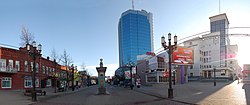Chelyabinsk
| Chelyabinsk (English) Челябинск (Russian) |
|
|---|---|
| - City - | |
 A pedestrian street in central Chelyabinsk |
|
|
|
|
|
|
|
|
|
|
| City Day | September 13 |
| Administrative status (as of September 2011) | |
| Country | Russia |
| Federal subject | Chelyabinsk Oblast |
| Administratively subordinated to | City of Chelyabinsk |
| Administrative center of | Chelyabinsk Oblast, City of Chelyabinsk |
| Municipal status (as of September 2011) | |
| Urban okrug | Chelyabinsky Urban Okrug |
| Administrative center of | Chelyabinsky Urban Okrug |
| Head | Stanislav Mosharov |
| Representative body | Council |
| Statistics | |
| Area | 530 km2 (200 sq mi) |
| Population (2010 Census) | 1,130,132 inhabitants |
| - Rank in 2010 | 9th |
| Population (2013 est.) | 1,156,201 inhabitants |
| Density | 2,132/km2 (5,520/sq mi) |
| Time zone | YEKT (UTC+05:00) |
| Founded | 1736 |
| City status since | 1787 |
| Postal code(s) | 454xxx |
| Dialing code(s) | +7 351 |
|
|
|
| on | |
Chelyabinsk (Russian: Челя́бинск; IPA: [tɕɪˈlʲæbʲɪnsk]) is a city and the administrative center of Chelyabinsk Oblast, Russia, located in the northeast of the oblast, 210 kilometers (130 mi) south of Yekaterinburg, just to the east of the Ural Mountains, on the Miass River, on the border of Europe and Asia. Population: 1,130,132 (2010 Census);1,077,174 (2002 Census);1,141,777 (1989 Census).
The fortress of Chelyaba, from which the city takes its name, was founded at the location of the Bashkir village of Chelyaby (Bashkir: Силәбе, Siläbe) by colonel Alexey (Kutlu-Muhammed) Tevkelev to protect the surrounding trade routes from possible attacks by Bashkir outlaws. During Pugachev's Rebellion, the fortress withstood a siege by the rebel forces in 1774, but was eventually captured for several months in 1775. In 1782, as a part of Ufa Viceroyalty that was later reformed into Orenburg Governorate, Chelyabinsk became a seat of a its own uyezd and finally was granted town status and its current name in 1787.
Until the late 19th century, Chelyabinsk was a small provincial town. In 1892, the Samara-Zlatoust Railway was completed which connected it with Moscow and the rest of European Russia. Also in 1892, construction of the Trans-Siberian Railway from Chelyabinsk started and in 1896 the city was linked to Ekaterinburg. Chelyabinsk became the hub for relocation to Siberia. For fifteen years more than fifteen million people - a tenth of Russia - passed through Chelyabinsk. Some of them remained in Chelyabinsk, which contributed to its rapid growth. In addition, in Chelyabinsk was organized custom office set "customs fracture" the bounding duty-free grain and tea to the European part of the country that led to the emergence in mills and set the tea-packing factory. Soon Chelyabinsk started turning into a major trade center, its population reached 20,000 inhabitants by 1897, 45,000 by 1913, and 70,000 by 1917. For rapid growth at the turn of the 20th century, similar to American cities, Chelyabinsk called "Behind the Urals Chicago".
...
Wikipedia



